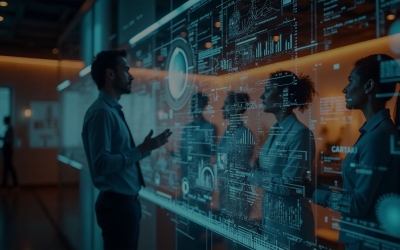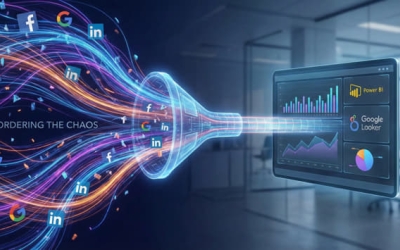The International Executive MBA is designed to solve the most critical challenges faced by leaders like you in a globalised and constantly changing business env
 Blog
BlogThe strategic role of the purchasing department in the company
The purchasing department of a company plays a fundamental role in the value chain and, therefore, in the success of the organisation. Traditionally, this department was perceived as a purely operational unit, whose sole purpose was to acquire inputs and materials necessary for the proper functioning of the company.
However, in today's business environment, the functions of the purchasing department have evolved, acquiring a strategic and key role in the search for better prices and conditions that help to improve the efficiency of operations, reduce costs and ensure the supply of essential goods and services for the company.
In this article, we will explore in depth what the purchasing department is, what its main functions are, how it can help improve the quality of the company's products and services and its role in gaining a competitive advantage.
What is the purchasing department and what are its functions?
The purchasing department is responsible for procuring all the goods and services that the company needs to operate. This includes everything from the raw materials needed for the production of products, to the inputs and services that enable the organisation to function efficiently.
However, its work is not limited to procurement alone, but it must ensure that these are made under the best possible conditions in terms of price, quality and delivery times. To meet these objectives, the purchasing department performs a number of basic functions:
- Evaluating and selecting suitable suppliers: identifying reliable suppliers who offer the necessary products or services, as well as the stability and quality to ensure the correct functioning of the company.
- Negotiating prices and conditions: achieving competitive prices to guarantee the company's profitability.
- Internal control and order tracking: ensuring that orders arrive on time, in the agreed quantity and quality through efficient resource management and good administration and accounting. In addition, implementing good internal control avoids supply-related problems and allows for better resource planning.
- Supplier relationship management: Establishing strong relationships with suppliers ¡ to obtain better trading conditions, as well as to ensure a continuous supply of goods and services.
- Use of technology tools: Use of technology tools such as procurement management platforms, ERP systems and supplier databases, facilitating informed decision making and optimisation of procurement processes.
- Market knowledge: Keeping up-to-date on market trends and fluctuations in raw material prices and being able to anticipate potential supply problems or price increases.

The strategic role of the purchasing department in reducing costs and improving efficiency
One of the main objectives of the purchasing department is to reduce costs. This not only involves obtaining better prices from suppliers, but also optimising procurement processes to improve operational efficiency. Reducing costs allows the company to be more competitive in the market, as it can offer products at lower prices without compromising its profit margin.
The purchasing department has an important role to play in gaining this competitive advantage, as its work has a direct impact on the company's profitability. Good control of procurement costs and good management of supplier relationships allows the company to have greater control over its profit margins and reduce the risks associated with price fluctuations.
On the other hand, efficient management of purchasing processes also contributes to improving the quality of the company's products and services. By carefully selecting suppliers and ensuring that they meet the required quality standards, the purchasing department can ensure that the products that reach end customers are of the highest quality. In addition, by maintaining strong relationships with suppliers, it is easier to manage any quality issues that may arise during the production or supply process.

The importance of informed decision-making
This area also plays a key role in decision making within the company. By being responsible for evaluating the best offers, negotiating with suppliers and monitoring market prices, the department provides critical information that influences the company's strategic decisions, such as the choice of the most suitable suppliers or the optimal time to make purchases of raw materials or specific products.
Furthermore, the purchasing department's decisions affect not only costs, but also the quality of the final product, delivery times and customer satisfaction. A bad decision in the purchasing process can have repercussions throughout the entire value chain, from production to final delivery to the customer.
Best practices for efficient purchasing department management
In order for the purchasing department to operate efficiently, it is essential to follow a number of best practices to ensure that processes are optimised and results are continuously improved. Some of these best practices include:
- Establishing strong relationships with suppliers: They allow you to negotiate better prices, ensure continuity of supply and resolve any problems that may arise more quickly and efficiently.
- Maintaining good internal control: Facilitates proper inventory management, avoiding stock-outs or overstocking and ensuring that orders are placed in a timely manner.
- Use technological tools: This enables tasks to be automated, errors to be reduced and operational efficiency to be improved.
- Rigorously evaluate and select suppliers: Ensures that prices are competitive, required quality standards are met and delivery times are met.
- Encourage collaboration with other departments: Ensures that purchasing is aligned with the overall needs and objectives of the company.
In short, the purchasing department is no longer just an area responsible for procuring goods and services. Today, its role is much more strategic and plays a fundamental role inreducing costs, improving the quality of products and services, and achieving a competitive advantage in the market.
Good purchasing department management involves selecting the best suppliers, managing relationships with them efficiently, maintaining good internal control and making the most of the technological tools available. Only in this way will the department be able to contribute effectively to the success of the company, improving its profitability and its position in the market.


Agri-food is a strategic sector for both the national and international economies.



A company or organization that anticipates, identifies needs and threats, foresees, and makes strategic and operational decisions based on Comprehensive Risk Management



In ENAE Business School's Official Master in Logistics and Operations Management program, you will learn how to analyse the performance of a company's operation

Business decision-making can no longer be based on intuition.


Automated Marketing Reports: From ‘Excel paralysis’ to real ROI (Guide with Power BI, Looker and Tableau Templates)

Master's Degree in Logistics in Spain: Key Factors for Choosing a Leading Program
Daniel Román Barker
Marketing Specialist at ENAE Business School, where he is part of the team responsible for planning, producing and optimising digital content for the enae.es and enae.com websites, as well as for the school's various social media channels. Using the Drupal CMS, he manages the publication and updating of pages and articles, ensuring brand consistency, content quality and user experience.
He specialises in SEO and performance marketing, defining and implementing the organic content strategy with the support of tools such as Sistrix and Google Search Console to improve positioning and qualified traffic to master's programmes and executive courses. In addition, he designs, configures, and optimises online advertising campaigns on Meta, LinkedIn, TikTok, and Google Ads, aligning segmentation, messaging, and objectives with student recruitment. His work contributes to ENAE's organic and paid growth and strengthens its position as a leading business school nationally and internationally.













